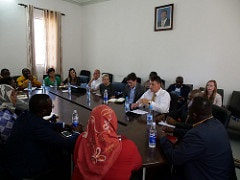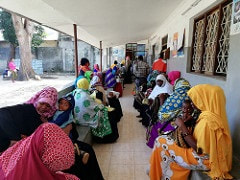 Roel Deseyn. Photo EPF
Roel Deseyn. Photo EPF Roel Deseyn, federal MP and chair of the Parliamentarians for the 2030 Agenda travelled to Tanzania in late June as part of a delegation of European politicians. He spoke to Tanzanian MPs, policy makers, NGO staff and youth activists about the many challenges relating to sexual and reproductive health and rights.
 Women at a health post. Photo EPF.
Women at a health post. Photo EPF. Tanzania, in the Great Lakes Region, bordering the DRC, Rwanda, Burundi, Kenya, Zimbabwe and Mozambique, is one of the 14 partner countries of Belgium’s bilateral cooperation. No less than 44% of the population is younger than 15 and almost half of the female population is of reproductive age. Teenage pregnancies are high, with 116 births per 1,000 15- to 19-year olds (to compare, Belgium has 5/1,000). Maternal mortality, especially among the many young mothers, is high, with 398 deaths per 100,000 live births (in Belgium as low as 7/100,000).
The parliamentarians noted the government is well aware of the problems and has a good strategy and action plan available. However, turning theory into practice has proved very challenging. Culturally, a big family remains the norm, and religious leaders have a big say in public opinion. This means local policy makers do not always dare put their necks on the line. It comes as no surprise therefore that a lot of sexual and reproductive health prevention is undertaken by international NGOs.
However, where the political will exists, practical problems arise. For example, Tanzania suffers from a serious lack of skilled health staff to answer the needs of its health sector. School attendance levels are low. For many, education remains limited to primary school, but even this does not guarantee that people leave school as literates. This is felt on the job market, with few qualified doctors and nurses and little well qualified teaching staff.
Despite the obstacles, MP Roel Deseyn is optimistic: “The Tanzanian government is well aware of the need for family planning. If everything remains as it is, the country runs the risk of doubling its population in 20 years from now. The country cannot handle this economically. It is therefore determined to turn family planning into a priority. I’m also confident about the political staff in parliament, with opposition members adopting a watchdog role when it comes to the government’s policy. However, a successful policy requires maximum investments in primary, secondary and higher education and particularly in the training and support of health staff. Belgium could contribute to this by paying specific attention to the health and educational sector in its collaboration with Tanzania.”
The parliamentary delegation was organised by the European Parliamentary Forum (EPF).
The parliamentarians noted the government is well aware of the problems and has a good strategy and action plan available. However, turning theory into practice has proved very challenging. Culturally, a big family remains the norm, and religious leaders have a big say in public opinion. This means local policy makers do not always dare put their necks on the line. It comes as no surprise therefore that a lot of sexual and reproductive health prevention is undertaken by international NGOs.
However, where the political will exists, practical problems arise. For example, Tanzania suffers from a serious lack of skilled health staff to answer the needs of its health sector. School attendance levels are low. For many, education remains limited to primary school, but even this does not guarantee that people leave school as literates. This is felt on the job market, with few qualified doctors and nurses and little well qualified teaching staff.
Despite the obstacles, MP Roel Deseyn is optimistic: “The Tanzanian government is well aware of the need for family planning. If everything remains as it is, the country runs the risk of doubling its population in 20 years from now. The country cannot handle this economically. It is therefore determined to turn family planning into a priority. I’m also confident about the political staff in parliament, with opposition members adopting a watchdog role when it comes to the government’s policy. However, a successful policy requires maximum investments in primary, secondary and higher education and particularly in the training and support of health staff. Belgium could contribute to this by paying specific attention to the health and educational sector in its collaboration with Tanzania.”
The parliamentary delegation was organised by the European Parliamentary Forum (EPF).

 RSS Feed
RSS Feed